Mergers and Acquisitions Module
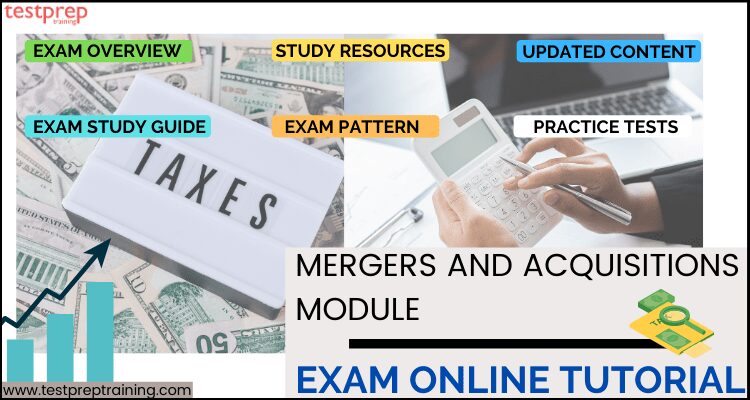
Mergers and Acquisitions Module helps candidates to get full and in-depth about mergers and acquisitions. This module helps in knowledge enhancement in various areas like:
- Firstly, it will help to get comprehensive and broad-based knowledge about mergers and acquisitions.
- Secondly, this will help you in getting familiar with various forms of re-organizations.
Target Audience
Mergers And Acquisitions Certificate Programs is best suitable for:
- Firstly, Teachers
- Secondly, Students
- Thirdly, Finance Professionals
- Lastly, Individuals with having an interest in this area.
Mergers and Acquisitions Module: Exam Details
Mergers and Acquisitions Module is an intermediate level online and self-study-based exam that can be given in the English language only. During the exam, an Open Office Spreadsheet will be given and candidates are allowed to bring all types of calculators to the test. Furthermore, there will be a negative marking of 0.25% for any incorrect answers. Also, all the NCFM Mergers And Acquisitions Module Exam Questions are in multiple choice format.
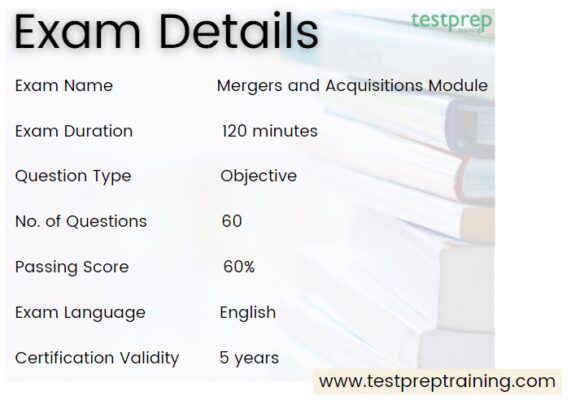
Exam Pattern
- For the Mergers and Acquisitions Module exam, there will be 60 objective-type questions in which there will be four or five alternative answers. You have to select the correct answer.
- Secondly, there will be a time duration of 120 minutes to complete the exam.
- Thirdly, NCFM provides passing marks for the Mergers and Acquisitions Module that is 60%.
- Fourthly, the cost of the Mergers and Acquisitions Module exam isRs.2006/- (Rupees Two Thousand and Six Only). inclusive of GST.
- Lastly, the NCFM Mergers and Acquisitions Module certification validity is for five (5) years.
Exam Registration
- For the Mergers and Acquisitions Module exam, candidates can do the registration online by accessing the link ‘Online Registration’. This link is available under the Education. After this, click on the certifications tab and then click on the Online Register / Enroll tab.
- Secondly, after the registration is completed, in some time candidates will receive a unique NCFM registration number that comes with a user id and password. And, a confirmation message will be sent to the email id and mobile number provided during registration.
- Thirdly, using the id and password, candidates can access their online NCFM account for making payment. They can complete the test enrollment and update their address details. Moreover, they can also check study material status and view certificates.
- Lastly, candidates should provide their latest address in their online NCFM profile. However, to modify the address details candidates can use the ‘Edit Profile’ link available in their NCFM online login.
NCFM Mergers And Acquisitions Module Course structure
NCFM provides a course outline for the Mergers and Acquisitions Module exam. This helps in learning and understanding the topics. This include:
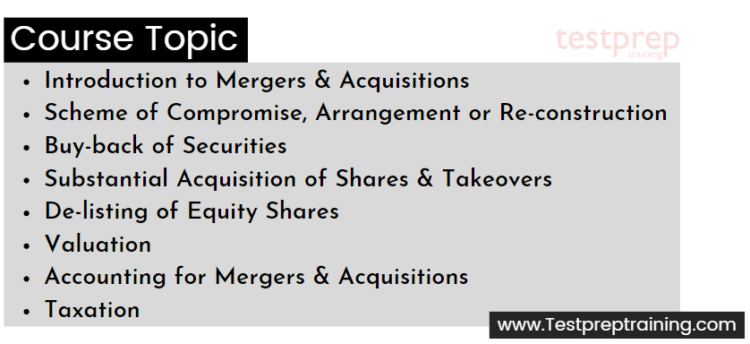
1. Introduction to Mergers & Acquisitions
- Background
- Types of Re-organisation
- Internal Re-organisation
- External Re-organisation
- Stock Swap
- The Section 293 (1) (a) of the Companies Act, 1956
- Sick Companies
- Benefits of Re-organisation
- Re-organization Costs
- Due Diligence
2. Scheme of Compromise, Arrangement or Re-construction
- Definitions
- Company
- Arrangement
- Unsecured Creditors
- Appointed Date and Effective Date
- Power of compromising or making arrangements with creditors and members
- NCLT’s Power for Enforcing Compromise or Arrangement
- NCLT’s Power for Facilitating Reconstruction or the Amalgamation
- Dissenting Share-holders
- Amalgamation in National Interest by the Central Government
3. Buy-back of Securities
- Regulation and Definitions
- Associate
- Control
- Small Share-holder
- Tender Offer
- Permitted Methods of Buy-back
- Provisions in the Companies Act, 1956
- Buy-back through Tender Offer
- Escrow Account in Tender Offer
- Payment to Security-holders in Tender Offer
- Buy-back from Open Market
- Through stock exchange
- Through Book-building Process
- General Obligations
- Obligations of Company
- Obligations of Merchant Banker
4. Substantial Acquisition of Shares & Takeovers
- Regulation and Definitions
- Shares
- Acquirer
- Control
- Target Company
- Persons Acting in Concert
- Associate
- Immediate Relative
- Offer Period
- Tendering Period
- Compulsory Open Offer
- The Substantial Acquisition of the Shares or the Voting Rights
- Acquisition of Control
- Indirect Acquisition
- Voluntary Offer
- Offer Size
- Offer Price
- Mode of Payment
- General Exemptions
- Exemptions by SEBI
- Manager to the Open Offer
- The timing of Public Announcement or Public Statement
- Dissemination of the Public Announcement or the Public Statement
- Contents of Public Notice or Public Statement
- Letter of Offer
- Escrow
- Other Procedural Requirements
- Conditional Offer
- Competing Offers
- Payment of Consideration
- Completion of Acquisition
- Withdrawal of Open Offer
- Other Obligations
- Directors of Target Company
- Acquirer
- Target Company
- Manager to the Offer
- SEBI Power to Issue Directions
5. De-listing of Equity Shares
- Regulation and Definitions
- Situations where de-listing is not permitted
- Voluntary De-listing
- Procedure where there is no exit opportunity
- Procedure where exit opportunity is necessary to be given
- Exit Opportunity
- Escrow
- Letter of Offer
- Bidding Period
- Share-holder Rights in Book-building Process
- Floor Price
- Promoter’s Right to Reject Offer Price
- Successful Voluntary Offer
- Payment of Consideration or the Return of Equity Shares
- Share-holders’ Rights Post-Offer
- Failure of Offer
- Post-Closure Announcement
- Compulsory De-listing
- Share-holders’ Rights in Compulsory De-listing
- Provisions for Small Companies
- Listing of de-listed shares
6. Valuation
- Background
- Valuation Methods
- Market-based Methods
- DCF-based Methods
- Asset-based Methods
7. Accounting for Mergers & Acquisitions
- Regulatory Framework
- AS 14: Accounting for Amalgamations
- Definitions
- Types of Amalgamations
- Pooling of Interests Method of Accounting
- Purchase Method of Accounting
- Consideration
- Reserves
- Goodwill
- Profit & Loss a/c Balance
- Disclosures
- Amalgamation after Balance Sheet Date
- AS 10: Accounting for Fixed Assets
- Then, AS 26: Intangible Assets
- After that, ASI 11: Accounting for Taxes on Income in the case of an Amalgamation
- Ind AS 103: Business Combinations
8. Taxation
- Definitions
- Amalgamation
- Demerger
- Capital Asset whether Long Term or Short Term
- Transactions not treated as a transfer
- Capital Gains Tax
- Securities Transaction Tax (STT)
- Block Deals
- Slump Sale
- Sale Consideration – Special Cases
- Notional Cost – Special Cases
- Depreciation on Transferred Assets
- Telecom License Transfer
- Preliminary Expenses
- Amalgamation / Demerger Expenses
- Carry forwarding and Set off of Loss and Depreciation
- Amalgamation
- Demerger
For More: Check Mergers and Acquisitions Module FAQs
NCFM Procedures
Exam procedures provide benefits to candidates by helping them to get started with the exam-related process. However, the NCFM exam procedure is designed to get familiarity with the exam pattern and its essential process. Some of the NCFM exam procedures include:
Making Payment
For the NCFM Module Exam, the payment can be made online using the NCFM portal. However, candidates must know that the exam fees validity is now changed from 180 days to 90 days. That is to say, it is necessary to complete NCFM exam enrollment within 90 days from the date of receipt of payment failing.
Test Taking Procedure
- Firstly, there are 200+ NSE test centers that conduct the NCFM exams. Out of which candidates can select the test centers according to their preferred location at the time of enrollment.
- Secondly, candidates have to reach the exam center 30 minutes before the test time.
- Thirdly, candidates have to go through the verification process before starting the exam. This verification requires an original Photo ID (PAN card, Driver’s License, or any other).
- Next, candidates will get a sheet(s) during the exam and are allowed to bring a scientific calculator and a pen during the test.
Issuing Certificate
Candidates successfully passing the NCFM exam will receive the certificate for modules at the test center. However, those who failed the exam will only receive a scorecard. The candidates must collect their results before leaving the test center.
Study Guide: Mergers and Acquisitions Module
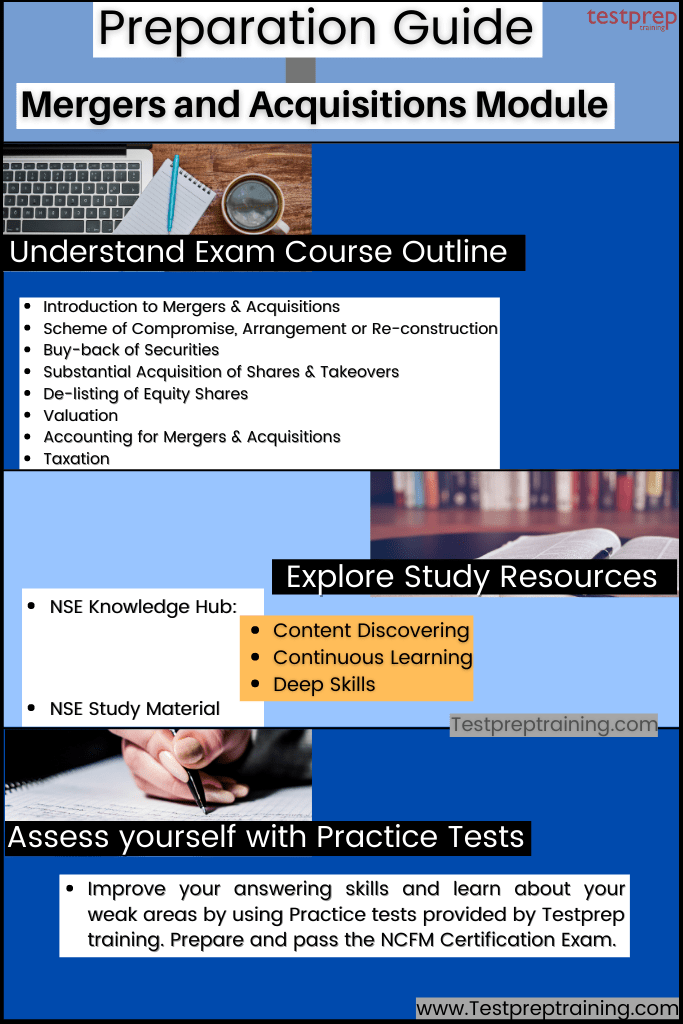
Getting Familiar with Exam Objectives
For the Mergers and Acquisitions Module exam, NCFM provides the course outline that contains topics divided into various sections and subsections. This course outline helps candidates get familiar with the exam’s various concepts to start their preparation. The topics for the Mergers And Acquisitions Module NCFM includes:
- Firstly, Introduction to Mergers & Acquisitions
- Secondly, Scheme of Compromise, Arrangement or Re-construction
- Thirdly, Buy-back of Securities
- Fourthly, Substantial Acquisition of Shares & Takeovers
- Then, De-listing of Equity Shares
- After that, Valuation
- Next, Accounting for Mergers & Acquisitions
- Lastly, Taxation
Knowledge Hub: NSE
NSE offers a knowledge hub with customized and community-based learning that comes with advanced AI technology. With having a learning platform for financial learning, the NSE knowledge hub provides big support to various academic institutions for helping them prepare advanced future-ready talent for the financial services industry. Using NSE Knowledge Hub candidates can:
- Firstly, get a chance to enhance their knowledge and become part of a learning community.
- Secondly, have unlimited access to the exam content and study resources.
- Thirdly, get expert-level assistance in this field.
- Lastly, learn from anywhere and anytime.
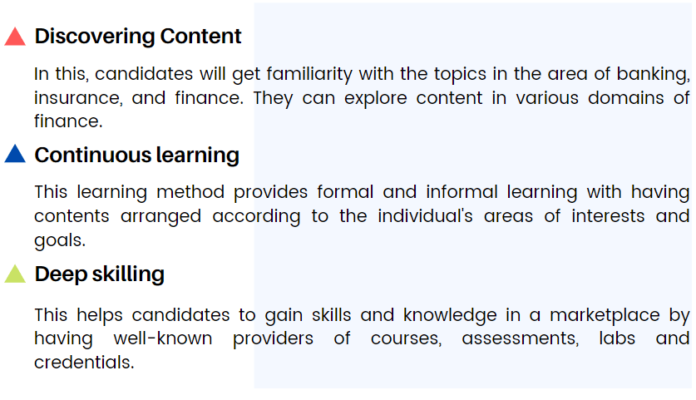
NSE Study Material
NSE offers candidates study material for its module exams that is in the form of a workbook. Candidates can issue this workbook only after making payment for the module. NCFM Mergers And Acquisitions Module Books strengthen your core concepts for the exam. However, for the Mergers and Acquisitions Module, candidates can download the workbook by logging into the account from the E-Library option. Further, these Workbooks for NCFM modules can be bought by sending a request letter with a demand draft of Rs. 500/- per module per workbook. The request letter should have:
- Firstly, valid name of the candidates
- Secondly, the name of the module
- Thirdly, complete postal address
- Next, contact and demand draft details.
- Lastly, the demand draft should contain the name of the candidate and module name on the backside as well.
Start taking Assessment using the Exam Practice Tests
NCFM Mergers And Acquisitions Module Practice Tests can be important during the preparation of the exam. This is because the NCFM modules are designed for self-learning and thus, by using practice tests, candidates will get a better understanding of the topics. Further, these NCFM Mergers And Acquisitions Module Mock Tests will also improve your answering skills as well as it will help you to work on your weak areas. This as a result will get you a good exam revision and enhance your knowledge about the concepts of this module.


